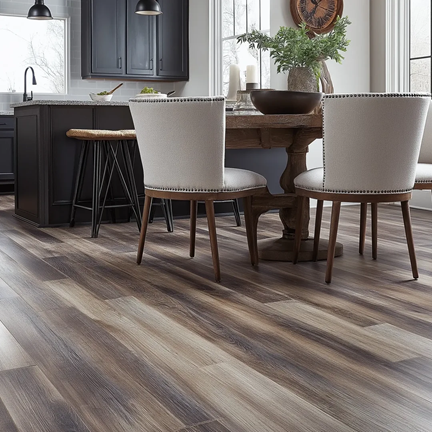Selecting the perfect flooring for your home represents one of the most impactful design decisions you'll make. The choice between vinyl and hardwood flooring affects not only your daily comfort but also your home's value, maintenance requirements, and long-term satisfaction. Each option brings distinct advantages that appeal to different lifestyles and priorities.
At Creative Floors Inc in Aurora, Illinois, we've helped countless homeowners navigate this decision. Through years of experience installing both vinyl and hardwood floors throughout the Chicago area, we've learned that the "best" choice depends entirely on your specific needs, budget, and lifestyle.
This comprehensive guide examines both flooring options in detail, helping you make an informed decision that you'll love for years to come.
Understanding Vinyl Flooring
Modern vinyl flooring has evolved dramatically from the basic options of decades past. Today's luxury vinyl planks (LVP) and luxury vinyl tiles (LVT) offer sophisticated designs that closely mimic natural materials while providing superior performance in challenging environments.
Vinyl flooring consists of multiple layers: a protective wear layer, a photographic design layer, a core layer for stability, and a backing layer for adhesion. This engineered construction creates a flooring option that's both beautiful and highly functional.
Key characteristics of vinyl flooring:
- 100% waterproof construction
- Scratch and dent resistance
- Softer underfoot than hardwood
- Available in endless design options
- Quick and easy installation
Understanding Hardwood Flooring
Hardwood flooring remains the gold standard for natural beauty and timeless appeal. Whether you choose solid hardwood or engineered hardwood, you're investing in a flooring material that has graced homes for centuries.
Solid hardwood consists of planks cut from a single piece of wood, while engineered hardwood features a real wood veneer over a plywood or fiberboard core. Both options provide the authentic wood grain, texture, and character that many homeowners desire.
Key characteristics of hardwood flooring:
- Natural wood beauty and grain patterns
- Can be refinished multiple times
- Increases home resale value
- Improves with age when properly maintained
- Available in numerous wood species and finishes
Durability and Maintenance: A Critical Comparison
Vinyl Flooring Durability
Vinyl excels in high-traffic areas and challenging environments. The protective wear layer resists scratches from pet claws, dropped items, and furniture movement. Most quality vinyl flooring carries warranties ranging from 15 to 25 years, reflecting manufacturers' confidence in the product's longevity.
Maintenance remains minimal: regular sweeping or vacuuming, occasional damp mopping, and prompt cleanup of spills. Unlike hardwood, vinyl never requires refinishing, making it an excellent choice for busy households.
Hardwood Flooring Durability
Properly maintained hardwood floors can last for decades or even centuries. However, they require more careful handling than vinyl. Water damage, deep scratches, and dents can occur, though most issues can be addressed through refinishing.
Hardwood maintenance involves regular sweeping, specialized wood floor cleaners, and periodic refinishing every 7-10 years depending on traffic levels. This ongoing care preserves the wood's natural beauty and extends its lifespan indefinitely.
Cost Considerations
Initial Investment
Vinyl flooring typically costs between $2-$8 per square foot installed, making it an attractive option for budget-conscious homeowners. The wide price range reflects quality differences, with luxury vinyl options offering premium features at higher price points.
Hardwood flooring costs range from $6-$15+ per square foot installed, depending on wood species, grade, and finish type. While the initial investment is higher, hardwood's ability to be refinished and its positive impact on home value often justify the expense.
Long-Term Value
Consider the total cost of ownership over time. Vinyl may need replacement after 15-25 years, while hardwood can last indefinitely with proper care and periodic refinishing. Additionally, hardwood typically increases your home's resale value more significantly than vinyl.
Performance in Different Environments
Moisture-Prone Areas
Vinyl dominates in bathrooms, basements, kitchens, and laundry rooms due to its complete water resistance. Spills, humidity, and even standing water won't damage quality vinyl flooring, making it ideal for families with young children or pets.
Hardwood requires careful consideration in moisture-prone areas. While some engineered hardwood products offer improved moisture resistance, traditional solid hardwood isn't recommended for bathrooms or basements.
High-Traffic Spaces
Both options handle heavy foot traffic well, but in different ways. Vinyl's synthetic construction resists wear patterns and maintains its appearance over time. Hardwood develops a natural patina in high-traffic areas, which many homeowners find appealing as part of the wood's character.
Aesthetic Appeal and Design Flexibility
Vinyl's Design Versatility
Modern vinyl flooring offers unlimited design possibilities. You can find vinyl that convincingly mimics hardwood, natural stone, ceramic tile, and even exotic materials. Advanced printing and embossing techniques create realistic textures and patterns.
Popular vinyl styles include:
- Wood-look planks in various species and finishes
- Stone and tile patterns
- Abstract and geometric designs
- Vintage and distressed appearances
Hardwood's Natural Beauty
Nothing quite matches the authentic beauty of real wood. Each plank features unique grain patterns, natural color variations, and character marks that create visual interest. Hardwood offers warmth and richness that synthetic materials struggle to replicate perfectly.
Hardwood species options include:
- Classic oak in various stains
- Rich walnut and cherry
- Exotic species like Brazilian cherry
- Trendy options like white oak and hickory
Installation Considerations
Vinyl Installation
Most vinyl flooring features click-lock installation systems that allow for floating floor installation without glue or nails. This method is faster, cleaner, and often suitable for DIY installation. Professional installation typically takes 1-2 days for an average-sized home.
Hardwood Installation
Hardwood installation requires professional expertise, especially for solid hardwood that must be nailed to the subfloor. The process takes longer and creates more dust and noise during installation. However, the end result is a permanently attached floor that adds structural value to your home.
Making Your Decision
Your choice between vinyl and hardwood ultimately depends on your priorities:
Choose vinyl flooring if you value:
- Budget-friendly pricing
- Low maintenance requirements
- Water resistance
- Quick installation
- Design flexibility
Choose hardwood flooring if you prefer:
- Natural wood beauty
- Long-term investment value
- Refinishing capability
- Traditional appeal
- Increased home equity
Creative Floors Inc: Your Aurora Flooring Experts
At Creative Floors Inc, we've been serving Aurora, Illinois, and the surrounding Chicago area with high-quality craftsmanship and competitive prices for years. Our experienced team understands the unique characteristics of both vinyl and hardwood flooring, helping you select the option that best fits your lifestyle and budget.
We offer comprehensive services including:
- Free in-home consultations and estimates
- Professional installation by experienced craftsmen
- Wide selection of quality vinyl and hardwood products
- Ongoing support and maintenance advice
Our commitment to excellence has earned us outstanding reviews from satisfied customers throughout the area. We believe that quality flooring installation should be accessible to every homeowner, which is why we maintain competitive pricing without compromising on craftsmanship.
Your Next Steps
Both vinyl and hardwood flooring offer distinct advantages that can enhance your home's comfort and value. The key lies in matching your choice to your specific needs, lifestyle, and long-term goals.
Ready to explore your flooring options? Contact Creative Floors Inc today for a free in-home consultation. Our flooring experts will assess your space, discuss your preferences, and provide personalized recommendations to help you make the best choice for your home.
Call us at (630) 537-1047 to schedule your free estimate, or visit our showroom at 850 S Frontenac St, Aurora, IL 60504. Let us help you transform your home with beautiful, high-quality flooring that you'll enjoy for years to come.
Frequently Asked Questions About Vinyl vs Hardwood Comparison
Vinyl flooring is the ideal choice for moisture-prone areas. Its 100% waterproof construction makes it perfect for bathrooms, basements, kitchens, and laundry rooms. Unlike hardwood, which can be damaged by water, vinyl can handle spills and humidity without any issues.
For homes with pets, children, and high foot traffic, vinyl flooring is an excellent option due to its superior scratch and dent resistance. Its protective wear layer stands up well to daily wear and tear. While hardwood is also durable, it can be more susceptible to scratches and dents, though these can often be repaired through refinishing.
Vinyl flooring is generally the more budget-friendly option. Installation costs typically range from $2 to $8 per square foot. Hardwood flooring is a larger investment, with costs ranging from $6 to $15+ per square foot installed, depending on the wood species and grade.
Vinyl flooring often features a simple click-lock system, allowing for a quick "floating floor" installation without the need for glue or nails. This makes it a potential DIY project for some homeowners. Hardwood installation is more complex and typically requires a professional to nail or glue the planks to the subfloor, ensuring a permanent and structurally sound result.
Hardwood flooring generally increases a home's resale value more significantly than vinyl. When properly maintained, hardwood floors can last for decades and often improve with age, making them a strong long-term investment. Vinyl may need to be replaced after 15-25 years, but its lower initial cost and minimal maintenance are key value points
Vinyl flooring is very low-maintenance, requiring only regular sweeping and occasional damp mopping. It never needs to be refinished. Hardwood requires more care, including the use of specialized wood cleaners and periodic refinishing every 7-10 years to maintain its beauty and extend its lifespan.
Vinyl flooring is a multi-layered product designed for durability and aesthetic appeal. It typically consists of four layers:
- Wear Layer: A protective top coat that resists scratches and stains.
- Design Layer: A high-resolution photographic layer that mimics the look of wood, stone, or other materials.
- Core Layer: A stable and waterproof core that provides structure.
- Backing Layer: The bottom layer that adds stability and adhesion.
For more personalized advice on the best flooring for your home in the Aurora, Illinois area, contact the experts at Creative Floors Inc. for a free in-home consultation.

